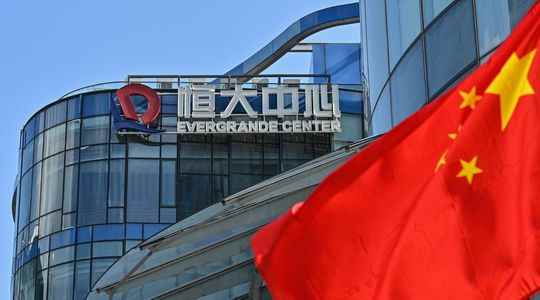If contagion is the nasty flaw of the Omicron variant, China is discovering that the same is true for real estate crises. The bankruptcy of the giant promoter Evergrandefar from being contained in a controlled economy, is dangerously spreading to the entire sector, which will lead the Chinese authorities to fundamentally rethink their growth model for the next decade.
Because real estate not only represents a good quarter of Chinese GNP, it has also been the main driver of domestic consumption for more than twenty years, due to the “wealth effect”. It is in fact thanks to the overvaluation of real estate, now estimated to be twice as high as that observed in the West, that the Chinese population has been able, with a level of indebtedness now similar to that of the United States, to finance its mass consumption. A scheme that mechanically reaches its limits in the absence of future real estate appreciation.
The new vector of growth should have come from the digitization of services, but the government recalled last summer that their future development should now take place at a pace compatible with the political control of young people, who are more attracted by discovery. of the metaverse than by government propaganda.
A risky choice
The scheme adopted seems to be similar to the model of Germany or Korea, whose per capita GNP should exceed that of France in just a few years. The upscaling of the export industry should follow two main lines: automation – thanks to artificial intelligence relayed by semiconductors – and decarbonization – carbon capture being the next strategic target, after the successes achieved. in electric battery, solar or wind power.
We understand better, then, the true nature of the “common prosperity” promised by President Xi. It is less about an addition of individual prosperity, as conceived in the West, than about the promise of the rise of the economic power of the country as a whole. A pattern reminiscent of that of the United States of the 1960s, where faith in technological progress – symbolized by the conquest of the Moon – had galvanized an entire population.
It will be remembered that Xi Jinping had, from the start of his second term in 2018, announced the program: China would first be “modern” from 2020 to 2035, before becoming “prosperous” from 2035 to 2049. A way of extending for fifteen years the old Chinese adage: “Rich country, poor people”.
This choice of growth pattern, which aims to favor productive investment over the acceleration of domestic consumption, is the opposite of the official propaganda of “dual circulation”. However, it is not without risk, as shown by the sharp economic slowdown in recent months – stronger than the official statistics suggest. In the longer term, a recent study by Natixis predicted annual Chinese growth potential capped at just 2.5% from 2030. Normalized growth with the rest of the world, a consequence of weak productivity gains and the annual decline Population.
We can therefore see that the plateau reached by Chinese real estate speculation will have consequences far beyond the year of the Tiger alone. Europe must prepare to see China strengthen its global position in pockets of excellence of future industries and, conversely, relatively disappoint in mass consumption, as well as in the digitization of B2C services.
A backlog in services
And this is precisely where the United States will want to win the battle: by buying Activision for 65 billion dollars, the largest acquisition in the history of global tech, Microsoft is anticipating the invasion of the metaverse into the video game world. But, above all, in that of enterprise software, a major source of future productivity.
The Chinese tiger may be all claws out, but it absolutely must catch up in the service sector, which represents 70% of the most developed economies. Otherwise, the United States will have every reason to believe that time is working for them.
*David Baverez is an investor, based in Hong Kong since 2011. He is the author of China-Europe: the big turning point (Le Passeur Éditeur, 2021), the English version of which has just been released under the title China-Europe: The Turning Point (Westphalia Press, 2022)
